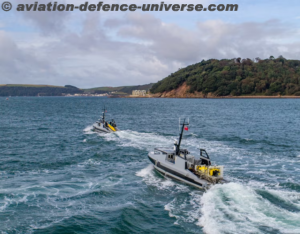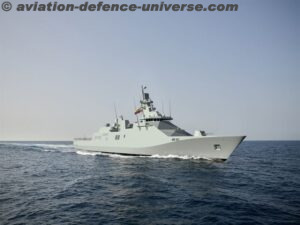- Indra and Navantia have signed a 150-million euro contract to equip these frigates with electronic defence systems and an X-Band surface surveillance radar
- This new contract complements the one signed by Indra last year to build an antenna for the S-Band AESA multifunction radar
- Indra’s technology reinforces the Spanish Navy’s sovereignty and boosts Spain’s technology capacities

Madrid. 09 July 2020. Indra has signed several contracts with Navantia for more than 150 million euros to equip the future F110 class frigates of the Spanish Navy with sensors that will make this ship one of the most advanced in the world.
These projects complement the contract that Indra signed last year to implement an antenna on the AESA S-band radar in these frigates, bringing the overall amount of the contracts awarded to the company for the construction phase to more than 325 million euros so far. This amount does not include the latest projects, all of which will be completed between 2020 and 2031.
With the signature of the new contracts, the company will supply the Rigel i110 radar electronic defence and the Regulus i110 communications interception systems, which together will enhance the ship’s situational awareness and protect it against possible attacks, as well as the Prisma 25 X multifunction solid-state radar, with maritime surveillance and tracking of low-altitude aerial targets.

It is a new generation of sensors based on flat array technology and high digitalization, combined into the innovative concept of an integrated mast that reduces frigates’ radar section and increases their stealth level. These arrays also increase the ability to detect and countermeasure threats thanks to the immediate antennas pointing. This technology will allow the Spanish Navy to operate this frigate in the most varied and demanding scenarios with the utmost safety, stealth and efficiency.
The development of this new generation of systems is the result of the work carried out by Indra in the past years in the framework of several technology programs linked to the F110, in cooperation with the DGAM, the Spanish Navy and Navantia. This is also proof of the Ministry of Defence’s commitment to strengthen Spain’s technological sovereignty and autonomy.
In an environment where naval systems are becoming increasingly important and represent a greater percentage in the construction of any military vessel, Indra positions itself, together with Navantia, as one of the companies best prepared to meet the needs of the most modern navies in the world. This technology helps to strengthen the competitiveness of Spanish ships in the international market.




































































































































